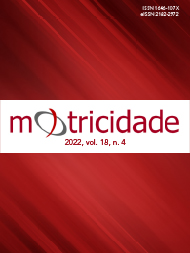Music, rhythmic gymnastics and expressiveness: an artistic performance
DOI:
https://doi.org/10.6063/motricidade.25789Palavras-chave:
Rhythmic Gymnastics, Music, Integration, Artistic PerformanceResumo
In rhythmic gymnastics, we appreciate the brilliant success in a true performing art whose sensitively expressive movements of great technical skill integrated into the music result in an exquisite and refined performance that involves body plasticity, musical receptivity, feelings and emotions. The practice of gymnastics significantly contributes to the development of body movements and musicality, boosting motor and artistic abilities by the acquisition of improved skills for jumping, running and practising different exercises. This study aimed to investigate how music is important in the development of rhythmic gymnastics. A literature review was carried out, including research from 2016 to 2021, published in Google Academic. We emphasise how the body action perfectly integrated into the music is essential for the artistic representation of an enchanting plastic, musical and grandiose beauty. We understand that encouraging physical exercise, especially artistic rhythmic gymnastics, is very important for the development of essential qualities for the individual, such as physical, behavioural, artistic and emotional attributes.
Downloads
Publicado
Edição
Secção
Licença
Os autores dos manuscritos submetidos para publicação deverão ceder, a título integral e permanente, os direitos de autor (copyright) à revista Motricidade e às Edições Sílabas Didáticas. A cedência de direitos de autor permite a publicação e divulgação do artigo em formato impresso ou eletrónico e entrará em vigor a partir da data de aceitação do manuscrito. Os autores concedem, ainda, os direitos para a revista Motricidade utilizar e explorar o respetivo artigo, nomeadamente para licenciar, ceder ou vender o seu conteúdo a bases de resumos/indexação ou outras entidades.
Nos termos da licença “Creative Commons”, os autores poderão reproduzir um número razoável de exemplares para uso pessoal ou profissional, mas sem fins comerciais. Nos termos da licença SHERPA/RoMEO, os autores poderão, ainda, disponibilizar/arquivar uma cópia digital final (versão postprint) do artigo no seu website ou no repositório científico da sua instituição.


